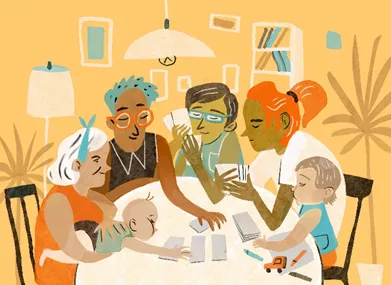Growing up under the care of our parents, I never once thought of or considered being a caregiver to my mother. My father suddenly died when I was eleven years old, so I did not get to experience his aging. As the third child, I recall looking up to my older sisters. In my mind, I am sure they would be the ones to take on the caregiver role. The assumption of the eldest sibling becoming a caregiver is not always the reality, as partial as it may seem. In most families, one sibling usually becomes the primary caregiver to an aging parent(s). In my case, it was I, sibling #3. The reasons may be geographic location, age, health, educational experiences, and financial abilities.
Despite the possibilities above, siblings have a role. A family conference is essential to determine who can do what and when. Hopefully, the gathering can occur before critical decision-making is necessary. This proactive step will reduce the excuses many siblings can have when missing in action.
How To Respond To Siblings Missing In Action
First, never attack siblings for missing in action. Attacking is the fastest way to destroy the thought of necessary help. Instead, discuss what role they will be comfortable participating in. Allowing siblings to share what they can provide to the primary caregiver will always be a win-win. Handling the caregiving experience requires compassionate restraint to get the desired outcome. Be ready to tolerate the reasons to be shared and then allow for solution-building.
Most Commonly Reason Used
Time is the primary reason for not helping the primary caregiver. While it may be true, we all have downtime. Giving that time to relieve a primary caregiver is simply the right thing to do. Remember, the caregiver would enjoy a little downtime. Caregiving is demanding, and breaks are needed to continue providing safe care.
Finances are another reason siblings use to avoid helping. Informal caregivers do not get paid, and many stop working to care for loved ones. Sibling pooling resources can go a long way to help. Helping from afar is still possible, but siblings must be willing. It is important here to share the type of assistance needed.
The Decline Of An Aging Parent is hard to see. I understand this reason up close and personal. Seeing my mother decline was challenging. Caring for someone with a chronic illness or cognitive decline, like dementia, is a struggle. Siblings must find the strength to help out, even when seeing their loved one decline is difficult. Sometimes, visiting a doctor’s appointment with a loved one can help siblings feel comfortable.
As Your Proactive Caregiver Advocate, know that most siblings are not purposefully missing in action. It is hard seeing loved ones decline. Never imply or accuse, which will hinder sibling involvement. Addressing sibling concerns and apprehensions is the first step in getting help and getting downtime. Be safe! Be well!
Dr. Cynthia J. Hickman is a retired registered nurse and case manager, CEO of Your Proactive Caregiver Advocate and author of From the Lens of Daughter, Nurse, and Caregiver: A Journey of Duty and Honor, and The Black Book of Important Information for Caregivers.

